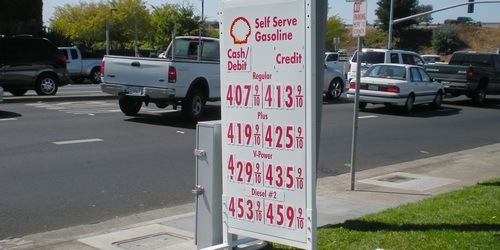Petroleum Program

The petroleum program calls for local Weights and Measures to inspect and verify that local businesses are compliant in observing California's petroleum products laws. Because petroleum products are vital to the states economy, California laws regulates how petroleum products, such as motor fuels are advertised. Motor oils and other petroleum products are also subject to labeling and branding requirements.
The petroleum products inspections program requires county weights and measures inspectors to inspect and confirm that local businesses are in compliance with the following:
- Street sign advertisements (multiple pricing, discounted pricing, etc.)
- Fuel dispenser labeling (brand, product, grade, and octane designation)
- Storage fuel tank labeling
- Petroleum product labeling (motor oil, transmission oil, brake oil, engine coolant, out-board motor oil)
- Air and water services requirement for fuel purchasing customers
- Disabled driver assistance policy posting
Frequently Asked Questions
Can a retail fuel business add a surcharge fee for the use of a credit card?
No. Businesses cannot add a surcharge according to the California Civil Code Section 1748.1(a).
Can a retail fuel business charge a transaction fee for the use of a debit card?
Yes. However, the business needs to disclose the fee to its customers by posting it near the card reader device.
My owner's manual says the tank in my car only holds 16 gallons but I was able to put 17.5 gallons into it. Is something wrong with the pump?
There may be nothing wrong, sometimes manufacturers change the size of the tank in a particular car and the owners manual is not updated. Check with the dealer. If you are sure the manual is correct, there might be a problem with the fuel dispenser. Contact your local weights and measures office if you have additional concerns or have a question.
I believe I was sold contaminated fuel. How do I go about reporting contaminated fuel?
Weights and Measures inspects local fuel supplies upon receiving complaints from the public. Samples of the product in question are obtained from the business selling the product and transported to the state's petroleum laboratory for testing. By law, fuel samples are tested using procedures developed by the American Society of Testing and Materials (ASTM). The official lab results will determine the appropriate level of enforcement against the seller or supplier of non-compliant motor fuel.
- Gasoline samples are checked for: octane number, distillation, water and sediment.
- Diesel fuel is checked for: cetane number, distillation, flash point, water and sediment.
- Timing is crucial when attempting to manage suspected contaminated fuel offered for sale.
Because some service stations receive multiple fuel deliveries in a given day, it is important to immediately report any suspected contaminated or non-compliant fuel to local Weights and Measures.
What factors play in to how motor fuel prices are determined in the market place?
The market is the main driver of motor fuel prices. Prices tend to fluctuate as supply and demand shrink and grow. High travel, holiday periods tend to drive prices up as supplies are stressed during high demand periods. Regulations also have an effect on fuel prices. California law requires refineries to produce winter and summer blend fuels throughout the year. This additional production process creates additional costs which are passed on to consumer through higher fuel prices.
 Translate
Translate